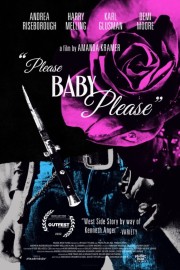Please Baby Please
The first thing that requires mention about Amanda Kramer’s “Please Baby Please” is its striking visual style. The 1950s decor of New York and leather jackets and young couples is all something we’ve internalized about the decade over the years, but what’s different is the blue and pink lighting throughout the film that looks so lush and haunting in Patrick Meade Jones’s cinematography. It feels like it takes place entirely within the Club Silencio sequence of “Mulholland Drive,” but surrealism isn’t necessarily what Kramer is after. Her film is exploring the gender fluidity a couple will explore after a run-in with a street gang outside their apartment building. The surreal nature of the film is just built into its style.
“Please Baby Please” begins as the aforementioned street gang is roaming the streets at night. The credits are rolling, with their pink and blue letters telling us who is responsible for the film. They attack a couple outside of an apartment building, beating them to death. Another couple comes up- Suze (Andrea Riseborough) and Arthur (Harry Melling); they are allowed up, but there’s something about the gang leader, Teddy (Karl Glusman), that awakens something in Arthur. As the film commences, Suze and Arthur’s relationship will forever change.
As I started to write about this film, one of the movies that popped into my head was Martin Scorsese’s “After Hours.” That movie is a long night in Soho for a mild-mannered man who initially went to see a girl, but now seems trapped by circumstances. In structure, “Please Baby Please” is not remotely the same thing, but the feel- and starting off point- is the same as these mild-mannered people seem drawn into a different world. We see them with friends, in clubs, and as they explore the world around them, possibly for the first time. For Arthur, it comes down to Teddy, and what’s awakened in him. For Suze, it’s an opportunity to speak to the woman (Demi Moore) living above them; her apartment is blue and she has the personal feeling of being a real-life Norma Desmond when she says the line, “I ought to be famous, but I’m married,” giving her the feeling that there’s more than just what society dictates out of life. Riseborough and Melling are a fascinating pairing, and great choices for leads whom are willing to challenge natural perceptions of what these characters are supposed to be.
One of the most interesting aspects of “Please Baby Please”- which, admittedly, I probably admire more than I enjoy it- is how Kramer has taken inspiration from ’50s culture and youthful narratives about rebelling against society in a way that allows her to explore sexuality in a way you wouldn’t have been able to at that time. The use of the song, “If I Don’t Have You,” is a good utilization of music that not only speaks to an individual character’s desires at the initial moment we hear it, but as a motif that speaks for several characters throughout the film. “Please Baby Please” will not be for everyone, but those who go with it, there’s a lot it has to offer.










